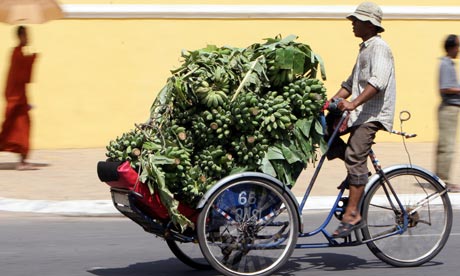UN expert calls on Cambodia to amend draft NGO law
Special rapporteur Surya Subedi concerned law in its current form 'may hamper the legitimate work of NGOs in the country'

Transporting bananas in Phnom Penh. Cambodia is a major aid recipient, but the proposed NGO law could affect support. Photograph: Tang Chhin Sothy/AFP
The UN special rapporteur on Cambodia has called on the government to change its draft law on NGOs, which is a source of much anxiety among civil society groups.
On Wednesday, Surya Subedi urged the Cambodian authorities to carefully review the current draft, expressing concern that "it may hamper the legitimate work of NGOs in the country".
Domestic and international human rights groups have strongly criticisedthe draft law, which they say threatens to impose severe restrictions on civil society's right to freedom of association and expression.
The statement from Subedi, currently professor of international law at the University of Leeds in the UK, will lend extra weight to such concerns.
"The government of Cambodia should not proceed with the draft NGO law in its present form," Subedi said in presenting his annual report on human rights in Cambodia to the UN human rights council in Geneva. "Of course, as a sovereign country, Cambodia is entitled to enact a law on NGOs, but the decision to adopt a law to regulate NGOs and associations is a critical initiative which requires careful attention, given its long-term implications for the development of Cambodian society - and in turn the country – itself."
Subedi acknowledged in his report that the overall human rights situation had improved in Cambodia, especially with the enactment of a number of key laws. He also noted that the government has accelerated a legislative programme designed to implement, among other things, key recommendations he made on the judiciary in his report last year.
However, the special rapporteur stressed there was still "a great deal of work to be done to strengthen the rule of law, to accelerate the process of democratisation and to enhance the capacity of parliament to hold executive to account".
As for the draft law itself, Subedi shares key concerns with civil society groups inside and outside Cambodia, particualrly regarding the complex and mandatory registration process and the lack of clear criteria on which registration applications will be considered.
Human rights groups last month called on donor governments to reassess their aid programmes to Cambodia if the draft law on NGOs was passed in its present form. Human Rights Watch and Global Witness, among others, wrote to William Hague, the foreign secretary, Hillary Clinton, the US secretary of state, and Australia's foreign minister, Kevin Rudd, to sound the alarm. They said the foreign ministers should make it clear to Cambodia's government that, if the proposed changes are adopted, they will reassess their aid programmes. They also urged multilateral aid agencies to review their assistance.
One of Asia's poorest countries, Cambodia receives between $50m and $70m a year from the World Bank. It is looking increasingly to China for aid and development. China is Cambodia's biggest source of foreign direct investment, with stated plans to spend $8bn on 360 different projects during the first seven months of 2011.


No comments:
Post a Comment